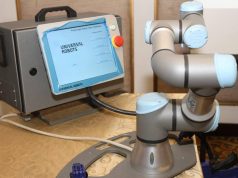
Some reasons holding MSMEs back from automation include a lack of capital, low programming literacy among employees, limited awareness of automation solutions and inadequate IT infrastructure conducive for automation. To overcome these obstacles, MSMEs can take the following small steps towards automation.
Adopt cost-effective technologies
Due to limited access to financing, many MSMEs lack the capital to invest in technological improvements. To address the problem businesses can start with automation technology that yields higher operational efficiency, but does not require a hefty investment. In fact, the good news is that automation can be very affordable for MSMEs. For instance, collaborative robots (cobots) – robots that work side-by-side with people – is an advanced robotic technology that assists employees to be more efficient while being cost-effective.
Cobots come with a relatively smaller price tag compared to traditional industrial robots, and have low implementation costs. These lightweight, compact cobots have sensors – stopping the machine upon sensing any obstruction – and built-in safety mechanisms that eliminate the need to erect safety fences (subject to risk assessment). This allows businesses to seamlessly fit the cobots into existing operations without incurring additional costs. It also removes the need to overhaul existing infrastructure, making cobots easier and less costly to setup.
Use flexible solutions
Choosing an automation solution that is flexible in deployment is another way to save cost.
Cobots’ high adaptability for different uses can benefit MSMEs financially. Due to their ergonomic design, compact size and easy programming, cobots can be efficiently deployed for different functions in different locations. This enables businesses to be more agile in responding to fluctuating consumer demand — in terms of product types as well as quantity – without investing in multiple types of machinery.
The flexibility also ensures that cobots can be used for their entire lifespan. For business owners who are not ready for a total transformation, flexible solutions are advisable as they can scale with the business in different phases over time. This is more cost-effective than changing the machinery to keep up with the business’ growth.
Adapt to employees’ abilities
Besides looking for cost-saving in the automation solution, firms should also consider adopting technology that is user-friendly and easy to use by their employees; many workers lack STEM (Science, Technology, Engineering and Mathematics) skills necessary for businesses to employ advanced technologies.
Adopting easily programmable equipment such as cobots, which employees can easily learn to operate, can help firms overcome shortages in technically skilled manpower. Employees can begin deploying the equipment for repetitive tasks within a short time, and focus on developing new competencies that will help them transition to higher value responsibilities.
These higher skilled responsibilities can be in the areas of systems management or research and development that will enable the business to move up the value chain.
Approach experts for options
The Philippines’ Department of Science and Technology is one useful information source on national initiatives, including the Small Enterprise Technology Upgrading Program (SETUP)[1]. SETUP assists MSMEs to adopt technological innovations to improve their operations and boost their productivity and competitiveness. The support it provides includes seed funding for technology acquisition, equipment, manpower training, consultancy and the establishment of product standards.
MSMEs can also attend automation technology fairs and exhibitions to improve their technological knowledge. Those who are ready to embark on automation can approach local system integrators to assess their operational needs. System integrators and equipment suppliers typically provide trainings to their customers. Universal Robots, for instance, has established UR Academy to raise the literacy of its cobot users. It features easy online training modules to help operators master the skill of programming a cobot in under 90 minutes.
Overcome hurdles
By adopting automation solutions tailored to their needs and budget, MSMEs can overcome barriers to automation. However, the greatest motivation has to come from the desire to be more efficient and competitive. MSMEs need to aspire for growth beyond the Philippines, and see themselves as an important part of the global supply chain where opportunities to scale upwards and outwards are plentiful.
Similarly, MSME owners should motivate employees to automate and align their mindset to the firm’s business goals. This can be achieved by helping employees understand the benefits of automation and assuring them of new learning and job opportunities within the business. After all, technology should serve as an enabler for both the business and its people.









